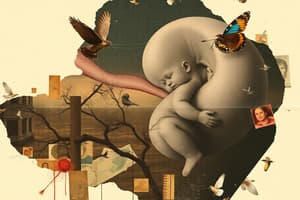Podcast
Questions and Answers
Which of the following are types of development? (Select all that apply)
Which of the following are types of development? (Select all that apply)
- Emotional regulation
- Social/emotional (correct)
- Cognitive (correct)
- Physical (correct)
What is the sequence of prenatal development and newborn stages?
What is the sequence of prenatal development and newborn stages?
Conception --> Prenatal Development --> The Competent Newborn
What occurs during conception?
What occurs during conception?
Sperm and egg unite to form the zygote.
What are teratogens?
What are teratogens?
How do fetuses respond to sounds?
How do fetuses respond to sounds?
Which of the following is an example of an inborn skill?
Which of the following is an example of an inborn skill?
Define maturation in psychology.
Define maturation in psychology.
What is cognition?
What is cognition?
What did Jean Piaget study?
What did Jean Piaget study?
What is a schema?
What is a schema?
What are assimilation and accommodation?
What are assimilation and accommodation?
Match the stages of Jean Piaget's cognitive development with their descriptions:
Match the stages of Jean Piaget's cognitive development with their descriptions:
What is object permanence?
What is object permanence?
What does egocentrism mean in developmental psychology?
What does egocentrism mean in developmental psychology?
Define the theory of mind.
Define the theory of mind.
What does conservation refer to in psychology?
What does conservation refer to in psychology?
What are autism spectrum disorders characterized by?
What are autism spectrum disorders characterized by?
What is the period of concrete operation?
What is the period of concrete operation?
Describe the formal operational stage.
Describe the formal operational stage.
What is stranger anxiety?
What is stranger anxiety?
What is attachment in child psychology?
What is attachment in child psychology?
What is self-concept?
What is self-concept?
Define puberty.
Define puberty.
Match Kohlberg's levels of moral reasoning with their descriptions:
Match Kohlberg's levels of moral reasoning with their descriptions:
What is moral intuition?
What is moral intuition?
Describe the difference between continuous and stages in development.
Describe the difference between continuous and stages in development.
What is rote memorization?
What is rote memorization?
Define prospective memory.
Define prospective memory.
What is the difference between cross-sectional studies and longitudinal studies?
What is the difference between cross-sectional studies and longitudinal studies?
What is imprinting?
What is imprinting?
Flashcards are hidden until you start studying
Study Notes
Types of Development
- Development encompasses three main categories: physical, cognitive, and social/emotional.
Prenatal Development and the Newborn
- Consists of three stages: conception, prenatal development, and recognizing the newborn's capabilities.
Conception
- Begins with the unification of sperm and egg to create a zygote, the first stage of a new organism.
Fetal Life Dangers
- Teratogens are harmful substances that can impair fetal development.
- Fetal Alcohol Syndrome (FAS) results in cognitive, behavioral, and physical abnormalities from alcohol exposure.
Fetal Life: Responding to Sounds
- Fetuses can hear and respond to sounds, learning to differentiate and habituate to them in utero.
Inborn Skills
- Newborns exhibit reflexes such as rooting, sucking, and crying, which are essential for survival and interaction.
Infancy and Childhood
- Infancy marks the phase from newborn to toddler, while childhood transitions from toddler to pre-teen.
Maturation
- Refers to biologically-driven growth that leads to predictable patterns of development, such as the sequential ability to lift heads, sit, crawl, and walk.
Cognitive Development
- Involves mental processes like problem-solving, knowledge retention, language understanding, and self-reflection.
Jean Piaget
- An influential figure who observed children's cognitive errors to understand their distinct thinking processes compared to adults.
Schema
- Represents a mental framework that organizes experiences and knowledge.
Assimilation and Accommodation
- Assimilation integrates new experiences into existing schemas; accommodation modifies schemas to incorporate new information.
Jean Piaget's Stages of Cognitive Development
- Sensorimotor: Birth to 2 years; exploration through senses and actions.
- Preoperational: 2 to 7 years; symbolic thinking but lacks logical reasoning.
- Concrete operational: 7 to 11 years; logical thinking about concrete events.
- Formal operational: 11 years and up; abstract and hypothetical reasoning.
Object Permanence
- A child’s understanding that objects still exist even when not visible, develops during the sensorimotor stage.
Egocentrism
- The difficulty young children have in recognizing other perspectives, as illustrated in their reasoning about siblings.
Theory of Mind
- The capability to understand that others have their own thoughts, beliefs, and perspectives.
Conservation
- The principle that quantity remains constant despite changes in shape or appearance.
Autism Spectrum Disorders
- Characterized by challenges in social interaction, language use, and flexibility in behavior, often linked to difficulty in understanding others’ perspectives.
Concrete Operation
- Cognitive operations such as analogies that develop from ages 6 to 11.
Formal Operation
- Emergence of allegorical thinking and abstract reasoning from age 11 onwards.
Stranger Anxiety
- Common developmental phase occurring between 9 to 13 months when children exhibit fear of unfamiliar individuals.
Attachment
- Emotional bonds formed with caregivers, influencing development; deprivation may lead to negative psychological outcomes.
Self-concept
- Development of a stable and positive identity, typically formed between ages 8-10.
Puberty
- Marks sexual maturation triggered by increased sex hormones, resulting in primary and secondary sexual characteristics and emotional shifts.
Lawrence Kohlberg's Levels of Moral Reasoning
- Comprised of three stages:
- Preconventional (up to age 9): Adherence to rules based on consequences.
- Conventional (early adolescence): Conformity to social expectations.
- Postconventional (later adolescence and adulthood): Recognizing that rules may sometimes obstruct higher principles.
Moral Intuition
- Instinctive emotional responses influencing moral decisions rather than analytical reasoning.
Continuous vs. Stages
- Nurture is seen as a gradual process, contrasting with nature, which develops in distinct stages.
Rote Memorization
- Refers to the process of learning facts without understanding, limiting deeper learning.
Prospective Memory
- The ability to remember planned intentions and future tasks.
Cross-sectional Studies vs. Longitudinal Studies
- Cross-sectional compares different age groups at one point in time; longitudinal examines the same individuals over an extended period.
Imprinting
- A critical period attachment process observed in certain animals, establishing bonds early in life.
Studying That Suits You
Use AI to generate personalized quizzes and flashcards to suit your learning preferences.




